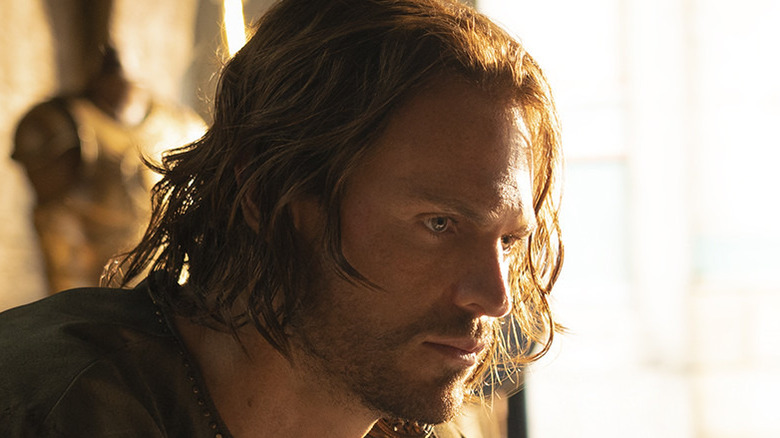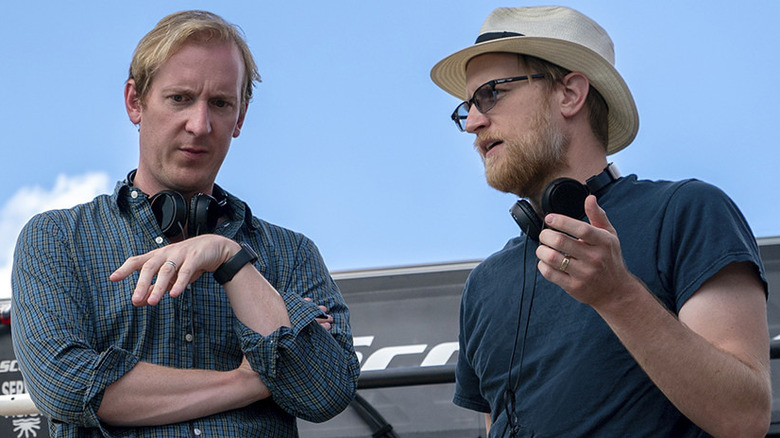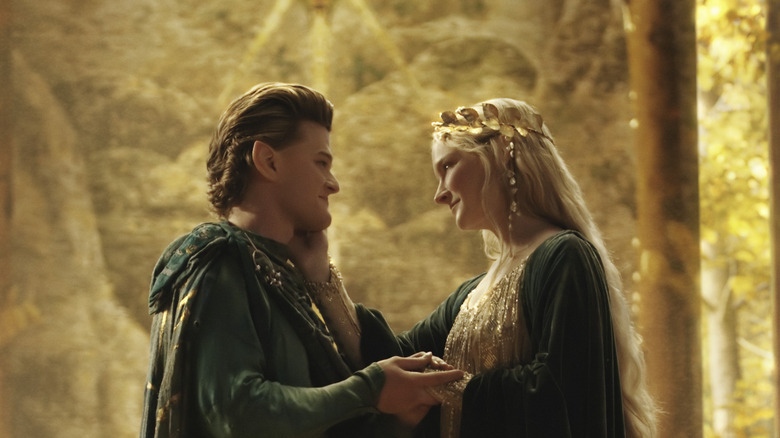The Linguistic Detail In Amazon's Rings Of Power That Reassures Tolkien Fans
Amazon's "The Lord of the Rings: The Rings of Power" is an upcoming high fantasy series inspired by the writings of novelist J.R.R. Tolkien, the man behind "The Hobbit" and "The Lord of the Rings." The new project will function as a prequel to all the cinematic adaptations that came before it, taking most of its story cues from "The Silmarillion," Tolkien's quasi-biblical historical text that documents the origins and early years of his sprawling, incomparably detailed fictional realm, Middle-earth.
While "The Lord of the Rings" was received with the strongest critical praise and "The Hobbit" was received with far lesser kindness, Amazon's production — which hasn't even been released yet, mind — has stirred a notable, possibly unique, level of tension among fans, who are concerned that "Rings of Power" is nothing more than an incredibly flashy cash grab. What's more is that every frame of footage that has been revealed to the public has undergone a level of scrutiny rarely provided by the government.
While imagery such as a war-torn Galadriel has stirred totally unnecessary conflict, the idea that Amazon might ruin a beloved franchise isn't beyond the scope of reality. If a company can squeeze a few extra dollars from intellectual property, then it absolutely will. Fortunately, J.D. Payne and Patrick McKay, both showrunners for "Rings of Power," have placed themselves in the crosshairs of public will with a few compelling factoids to share, including a linguistic detail that assuages some potential anxieties.
The showrunners imitated Tolkien's love for languages
In an interview with Vanity Fair, J.D. Payne and Patrick McKay explained how they handled language, a pivotal facet of respecting Tolkien's work (more on that later). "Both Patrick and I have religious backgrounds. I spent a lot of time just reading those sacred texts," Payne said. "Tolkien, sometimes, will play in that kind of a sandbox. We even came up with hero meters for each different race in Tolkien. Some of them will speak in iambs. Some of them will speak in dactyls. Some of them will speak in trochees."
Essentially, the script for "Rings of Power" was written with an eye for language to indicate the vast array of backgrounds these characters would have. At the very least, their attempt is admirable. At the most? Well, that remains to be seen. Tolkien was a philologist, but the author did more than study languages for his novels; he created new ones.
Tolkien did way more work than was probably required
Aside from chronicling a multi-millennial fictional history as prep work for published works, Tolkien created a series of entirely new languages for his characters to draw their speech from. Anyone who's tried to build a secret code with their best friend understands how difficult the task can be, but even that pales in comparison to the ostensibly excessive care the author took in building his own personal Duolingo. So to use J.D. Payne's own words, how significantly did Tolkien play in that sandbox? Depending on who answers that question, he created anywhere between two and two dozen languages.
The viability of his languages varies, however. Some, like Quenya and Sindarin, which are both Elvish languages, are functional enough to be read, written, or yes, even spoken (via MPR News). Others, such as Westron, are substantive but incomplete (via Tolkien Gateway). Further, there are those that exist almost exclusively in name alone. While such lengths feel extreme, Tolkien understood the depths to which history, language, and character are interwoven. Whenever Aragorn soliloquizes in Elvish, as the Dúnedain often do, the action serves as evidence of both his personal wisdom and the robustness of the culture of which he stood upon the fringe.
In comparison, J.D. Payne and Patrick McKay's efforts might seem infinitesimal, but at the same time, it speaks volumes about the dedication they feel to the man behind the mythos, something that fans are finally finding respite through.
Rings of Power might still have a chance with fans
In the subreddit r/LOTR_on_Prime, u/Mitchboy1995 shared a screenshot from the Vanity Fair piece in a post titled "The most reassuring thing I've seen about the show so far." Fans were grateful to the user for signal boosting the information since it seemingly lifted a great weight from many shoulders. One such lighter soul is u/adamexcoffon, who said, "Wow. You know, when '[T]he [H]obbit' got out, something felt off in dialogues, especially comparing it to the wonderful lines we got from LOTR movies (not even talking 'bout books) ... I was wondering how the show could capture the essence of Tolkien's beautiful tongue, elevating discussions without any material for it in SA. This could totally do it. I'm very excited."
Another commenter, u/Eoghann_Irving, added, "The fact they are thinking about this aspect of it is encouraging for me at least. It's actually quite difficult to mimic archaic speech styles. There's a lot more too [sic] it that [sic] just not using a swear word. Tolkien famously refused to use modern words in LOTR but he also had an ear for rhythms and rhymes (the poetry being the obvious example)." For those who haven't taken a pass at Tolkien's novel in three parts, "The Lord of the Rings" is packed with poetry and lyrics, including a joke about the true origins of "The Cat and the Fiddle."
Almost 200 Redditors lent their words to the collective excitement brewing around the efforts that J.D. Payne and Patrick McKay imbibed "Rings of Power" with. The Amazon series is set to be released on September 2. Hopefully, the tension will have all been worth it and the world will see a respectful new addition to Middle-earth.



